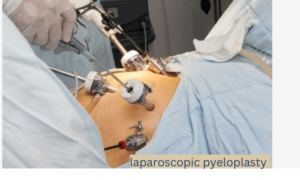 Laparoscopic pyeloplasty is a minimally invasive surgical procedure designed to correct a condition known as ureteropelvic junction (UPJ) obstruction in pediatric patients. This condition occurs when there is a blockage at the junction where the ureter (the tube that carries urine from the kidney to the bladder) meets the renal pelvis (the part of the kidney that collects urine). UPJ obstruction can lead to kidney damage, urinary infections, and other complications if not treated promptly. Here, we will delve into the details of laparoscopic pyeloplasty, its benefits, procedure, and recovery in children, and highlight the expertise of Dr. Apoorva Kulkarni, a pediatric surgeon in Thane.
Laparoscopic pyeloplasty is a minimally invasive surgical procedure designed to correct a condition known as ureteropelvic junction (UPJ) obstruction in pediatric patients. This condition occurs when there is a blockage at the junction where the ureter (the tube that carries urine from the kidney to the bladder) meets the renal pelvis (the part of the kidney that collects urine). UPJ obstruction can lead to kidney damage, urinary infections, and other complications if not treated promptly. Here, we will delve into the details of laparoscopic pyeloplasty, its benefits, procedure, and recovery in children, and highlight the expertise of Dr. Apoorva Kulkarni, a pediatric surgeon in Thane.
What is Laparoscopic Pyeloplasty?
Laparoscopic pyeloplasty is a surgical technique that uses small incisions and a camera (laparoscope) to guide the surgeon through the procedure. Unlike traditional open surgery, which requires a larger incision and longer recovery time, laparoscopic pyeloplasty offers several advantages:
Advantages of Laparoscopic Pyeloplasty
- Minimally invasive: Smaller incisions result in less pain and quicker recovery times.
- Reduced scarring: Smaller scars are often cosmetically preferred by both parents and patients.
- Shorter hospital stay: Children typically spend less time in the hospital compared to open surgery.
- Faster recovery: Most pediatric patients can return to normal activities sooner.
- Lower risk of complications: Laparoscopic surgery may be associated with fewer complications.
The Procedure: What to Expect
Pre-operative Preparation
Before undergoing laparoscopic pyeloplasty, the child will undergo a thorough evaluation, which may include:
- Imaging studies: Ultrasounds, CT scans, or MRI scans to confirm the diagnosis and assess kidney function.
- Blood tests: To evaluate kidney function and overall health.
The Surgical Process
- Anesthesia: The child is given general anesthesia to ensure they are asleep and pain-free during the procedure.
- Incisions: The surgeon makes a few small incisions in the abdomen.
- Insertion of the laparoscope: A camera is inserted through one incision to visualize the internal organs.
- Surgical instruments: Specialized instruments are used through other incisions to remove the obstructed section of the ureter and reattach it to the renal pelvis.
- Closure: The incisions are closed with sutures or surgical glue.
Post-operative Care
After the procedure, the child will be monitored in the recovery room until they wake up from anesthesia. Parents can expect:
- Pain management: Mild pain is common, and the surgeon will provide medication to manage discomfort.
- Hydration: Children are encouraged to drink fluids and may resume a normal diet once tolerated.
- Follow-up appointments: Regular check-ups to monitor kidney function and recovery are essential.
Recovery and Prognosis
Recovery from laparoscopic pyeloplasty varies among children but generally involves:
- Hospital stay: Most children can go home within 1 to 2 days after surgery.
- Activity restrictions: Light activities are encouraged, while high-impact activities should be avoided for a few weeks.
- Follow-up care: Regular follow-up appointments are crucial for monitoring recovery and ensuring proper kidney function.
Success Rates
Laparoscopic pyeloplasty has a high success rate, often exceeding 90%. Many children experience significant improvement in symptoms and kidney function following the procedure.Laparoscopic pyeloplasty is a safe and effective treatment option for pediatric patients suffering from ureteropelvic junction obstruction. The benefits of minimally invasive surgery, including reduced recovery times and lower complication rates, make it a preferred choice among pediatric surgeons. If you suspect your child may be experiencing symptoms of UPJ obstruction, it is essential to consult a qualified pediatric surgeon.
For expert evaluation and treatment, consider reaching out to Dr. Apoorva Kulkarni, a highly regarded pediatric surgeon in Thane. With his compassionate approach and specialized expertise, Dr. Apoorva Kulkarni is dedicated to providing the best care for children requiring surgical intervention.
